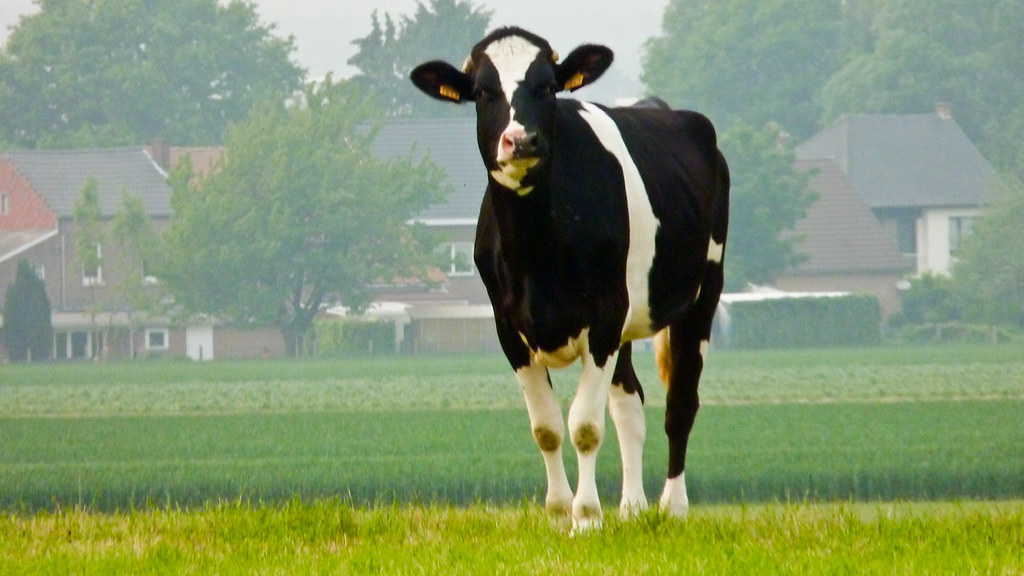
This week’s Top 5 comes from the team at economic research institute Motu.
As always, we welcome your additions in the comments below or via email to david.chaston@interest.co.nz.
And if you're interested in contributing the occasional Top 5 yourself, contact gareth.vaughan@interest.co.nz.
1. Staying close - at a distance.
With an increasing number of people in isolation, the importance of books is palpable. With this in mind, this article explores the creative ways bookshops are staying in contact with their customers from a distance. This has included community spaces on social media, running virtual events and bicycle delivery services. By gaining insights from a variety of book sellers, it is clear books are as much about community as they are about reading.
2. Cows communicate with unique moos.

Alexandra Green, a University of Sydney PhD student and cow enthusiast, spent five months studying how a herd of Holstein-Friesian cows communicate. She found that they use different moos in different emotional states and that it is "highly likely" they can recognise each other by their vocal signatures.
3. The best books on past pandemics.
This Nature briefing points readers to five reviews of the best books that analyse and discuss pandemics the world has previously faced. These include: Frank Snowden’s work on the impact of infectious diseases on society; the bubonic plague epidemic in San Francisco in 1900; how the 1918 Spanish influenza epidemic changed the world; lessons from the 2013–16 Ebola crisis; and John Snow’s work on the cholera epidemics of the 1800s.
4. Seeing Sleep: The gift of Fitbit Data.

Fitbits measure data on steps, heart rate, sleep, and other personal metrics involved with fitness. Alex Albright creatively used R to illustrate her sleeping patterns of both when she slept and how much she slept over a 425 day period. Albright demonstrates that Fitbit data can be presented through a variety of visualisation techniques that allow users to better understand their sleeping behaviour and essentially ‘watch themselves sleep’. While this research does not explore causal effects of sleeping behaviour, it shows readers the cool ways in which data can be displayed and interacted with. Albright shares her code for others to give it ago.
5. How civic technology can help stop the pandemic.
In this Foreign Affairs article, Glen Weyl and Jaron Lanier attempt to explain why Taiwan has been so successful in fighting Covid-19. They argue that the remarkable effectiveness of the Taiwanese response is driven by Taiwan’s combination of tech-friendliness with a strong culture of democratic civic participation. Weyl and Lanier describe how Taiwanese communities, in cooperation with the Taiwanese government, created a range of apps designed to effectively allocate face masks and track exposure, all while protecting the privacy and rights of Taiwan’s inhabitants. By contrast, Weyl and Lanier argue, countries that are technologically advanced but undemocratic (China) and countries that are strongly democratic but somewhat technophobic (Germany) have been much less successful in containing the spread of the virus.
10 Comments
#5 - one could add a further category to the list: countries (like our own) countries that are strongly democratic but where the Gubmint is technologically clueless. Classic example: MoH contact tracing centre could not, until a day or two ago, run from anywhere else but Wellywood. Sheesh......
Don't worry, there are folk who think you can sieve thorium from seawater and still stay energy-positive. Ignorance isn't the preserve of the particular crowd you dislike.....
For those short on books, here's a fantastic family 'bubble' exercise, 'Together At Home', from New Zealand Geographic;
https://www.nzgeo.com/together-at-home/
Having a look at the photos/work from the children participating is a treasure.
I'm angry. The govt doesn't have a plan beyond the 4 week lock-in. The testing is still almost non-existant, boarder control is pathetic and the ICUs and other healthcare providers are still not adequately resourced. This reveals that our compassionate govt would rather imprison their population than take these comparably simple measures. Wiithout adequate testing, when the 4 weeks end, sick people and carriers will go back out into the community not knowing they have the virus. The govt must use this opportunity to test, to tighten boarder controls and to prepare the ICUs and other healthcare providers with adequate resources.
The mere half a billion NZDs out of all the billions they have allocated to Corona show they don't intend to. We can therefore expect to suffer on-going cycles of lock-ins and states of emergency. The general public have accepted the need to isolate for 4 weeks. If the govt continues to sit on their hands the public will not have the patience for more of it.
Indeed. And there's a commercially available (maybe, perhaps) bloods test that at least potentially shows up those who have been exposed (presence of specific antibodies) so (again, presumably) could get whole swathes of workers, employers and their pieces of the economy back up and running. But we're in the tender arms of the brown cardies now - lie back and enjoy the ride.
And This, from 12 Experts Questioning the Coronavirus Panic who think that the current cure is worse than the disease...
That was a very interesting read.
It's a great time to check out Gutenberg.org (https://www.gutenberg.org/browse/scores/top)
Many of those old books are admired for very good reason.
Perhaps, in these uncertain times, the bull....t from the state services, tertiary education (?) sector & the mainstream media will be shown up to be the crap that it really is. The globe's a small place these days. There's nowhere to hide. If you f...k up there's only hours before the rest of the world knows. Jacinda & co will be found out to be the PM & parliament who put the final nail into the coffin & destroyed New Zealand's future.
It began 50 years ago when working aged people discovered welfare.
LJM - you have had enough put under your nose hereabouts, to know that is wrong.
Read my piece - the one David put up on a quiet Sunday......
Take your time and read it well. Then compare your pre-judged, throwaway comment above.
Go well............ it's by far the best way to go, so I'm told
We welcome your comments below. If you are not already registered, please register to comment
Remember we welcome robust, respectful and insightful debate. We don't welcome abusive or defamatory comments and will de-register those repeatedly making such comments. Our current comment policy is here.